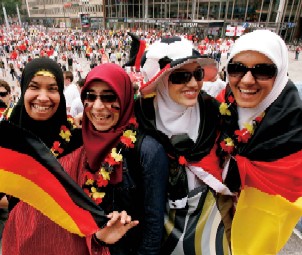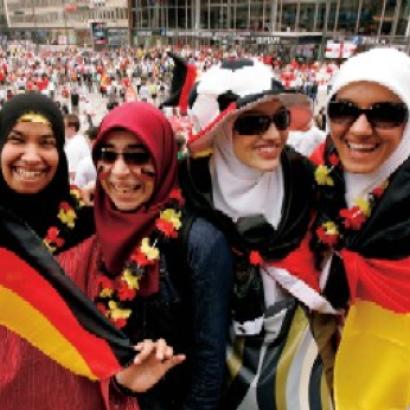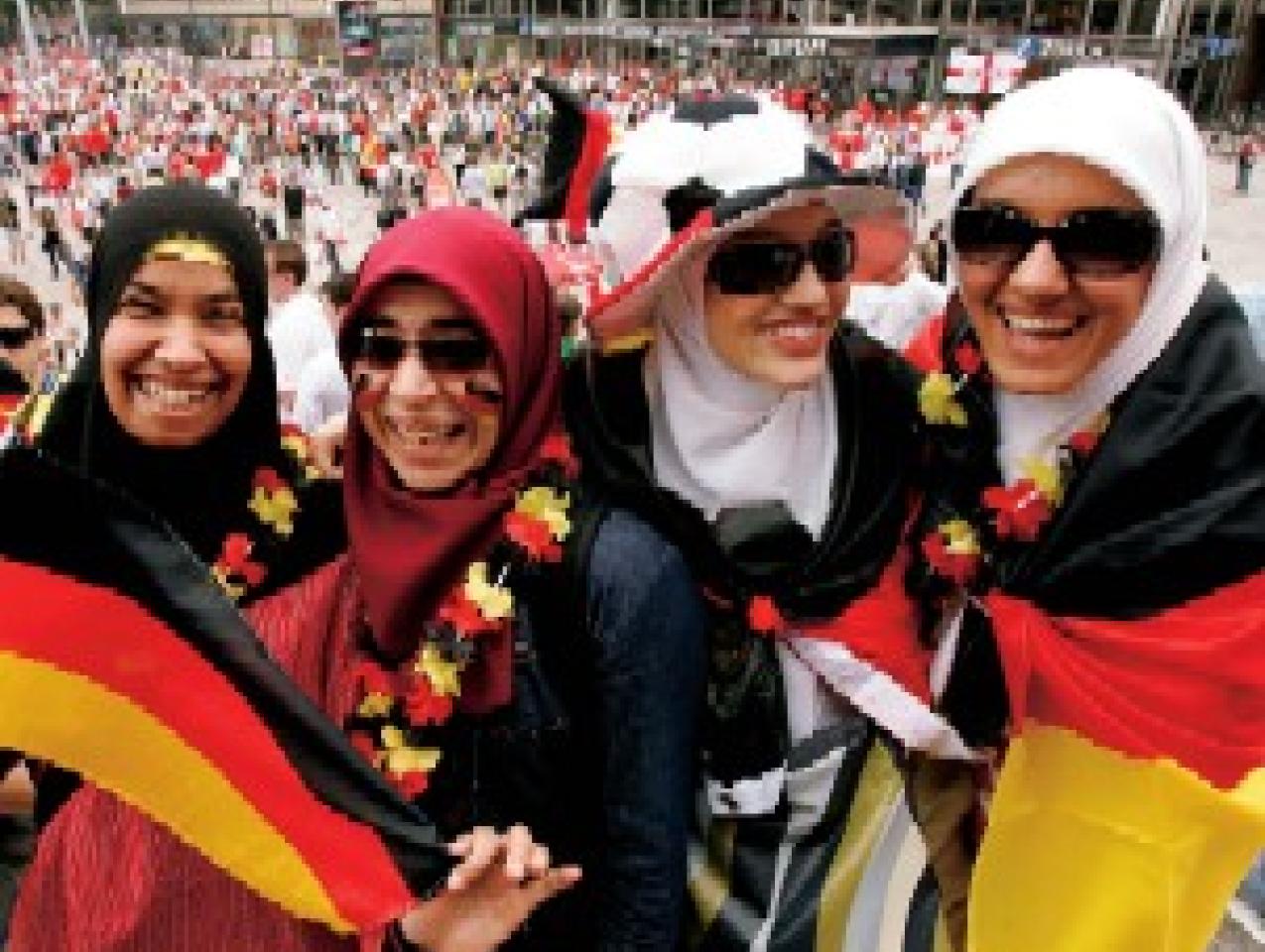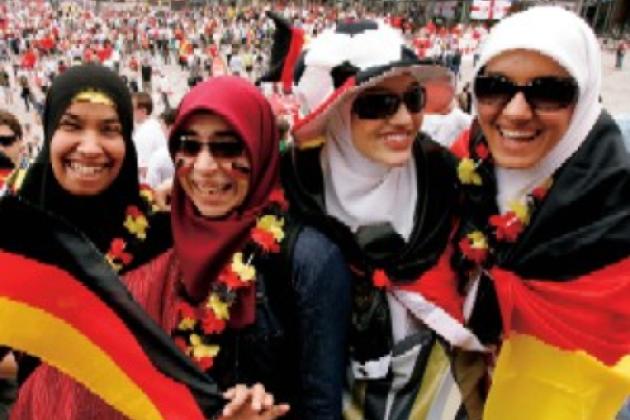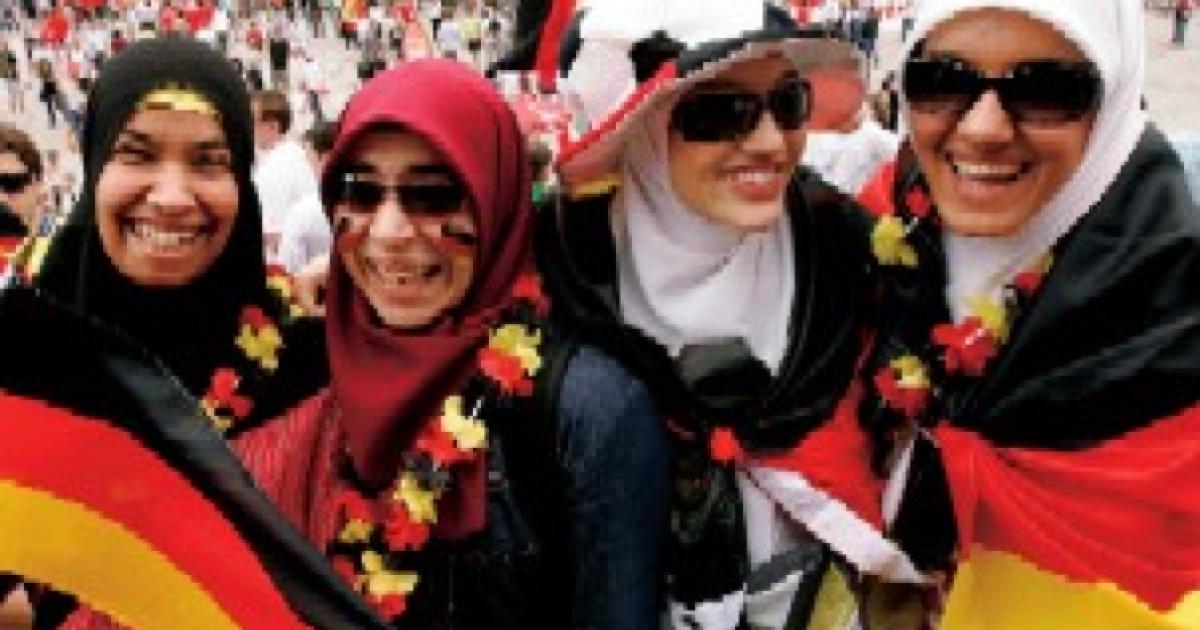- World
- Law & Policy
- Civil Rights & Race
- History
The relationship between religion and politics has become as contentious in contemporary Europe as it has long been in the United States. The United States has a constitutional separation of church and state to avoid a British style “Establishment.” Although this does not preclude religious people from participating in the public square, it is zealously policed by militant secularists. In more general respects, the United States has the advantage of distance, so that people who come here tend to mentally divorce themselves from their unloved past, in a way that is not true of an Algerian or Moroccan in Madrid, Manchester, or Marseilles. The United States' enormous spaces enable people to re-create themselves. Americans have an optimistic self-understanding that people can subscribe to in pursuit of their own vision of the good life. Incredibly, Britons are only just waking up to the idea of persuading people that life in Britain may have advantages over existence in, say, Somalia.
The absence of a welfare state in the United States means that Americans don't have nasty squabbles about who is getting more than their fair share, an especially contentious issue in that migrants have made no contribution to systems that were never intended to operate like an ATM in a dime-store wall. Americans also seem admirably skillful at turning huddled masses into American patriots, notwithstanding problems over migrants from Mexico or with those who wish to sing the national anthem in Spanish. In Europe, local government routinely encourages these differences by issuing all documents with translations into Turkish or Urdu, thereby also creating high-paid jobs for wholly unnecessary bureaucratic “coordinators” for these minorities. There is no “coordinator” for tax-paying English males like me.
Multiculturalism
We are belatedly waking up to the divisive effects of “multiculturalism,” a pernicious ideology with roots in the generic “Left university” that has undermined our confidence in ourselves. A Dutch government video intended for would-be migrants not only includes topless sunbathers and kissing gays—almost wilfully provoking Islam—but also scenes of a hapless migrant encountering bewildering complications and rudeness when he tries to board a bus. Unable to understand the wildly gesticulating man shouting in Arabic, the Dutch bus driver shuts the doors and drives off. Welcome to the Netherlands! If this seems almost calculated to put anyone off (the video is also very expensive), try Germany's new citizenship tests, which cynics say are harder than the questions on Germany's Who Wants to Be a Millionaire? television show. I couldn't answer half of them and I've been studying Germany for 30 years.
| Britons are only just waking up to the idea of persuading people that life in Britain may have advantages over existence in, say, Somalia. |
Some of our current concern with the re-intrusion of religion in politics is superficial, such as whether the British prime minister thinks he is accountable to God, did or did not pray with the U.S. president, or is about to become a Roman Catholic. The official line is “Downing Street does not do God.” Blair was even forbidden by his advisers to end a broadcast with the words “God bless.”
Moving on swiftly to a higher order of seriousness, some European debates will be familiar to you. Education is at the painful point where the state and the family intersect. In Britain, many families fabricate a history of fervent churchgoing, just to get their children into Anglican or Catholic schools. This is faintly comic, except of course in Northern Ireland, where confessional schools serve to cement bitter sectarian divisions reflected in an interconfessional marriage rate of about 2 percent in a population of 1.5 million. Will Muslim schools reinforce what is already evident from the baleful impact of Saudi-financed Pakistani madrassas, where some of our young citizens go to study the Koran and then wash up on Afghan battlefields fighting our soldiers?
The presence of Islam has further complicated matters, with very public controversies about girls wearing headscarves. Is this an essential item of pious kit, or an act of deliberate provocation, in which girls have been egged on by their radicalized brothers and uncles to assert their rights against the secular state while intimidating less-rigorous Muslim pupils? Beyond the limited issue of clothing—which in parts of Belgium carries fines for wearing the burka in public—looms the larger consequence of multiculturalism, a creed born in an era when the main concerns with immigration were about race and color rather than religion.
| A Dutch government video intended for would-be migrants not only includes topless sunbathers and kissing gays—almost willfully provoking Islam—but also scenes of a hapless migrant encountering rudeness when he tries to board a bus. Welcome to the Netherlands! |
Should we permit what is called legal dualism or federalism, in which certain religious communities are allowed to practice separate forms of law? I thought we had the “common law,” or its Roman alternatives, on the continent. Actually we have already licensed this in so-called “community restorative justice” in Northern Ireland, under which former terrorists have reconfigured themselves as social workers on behalf of their so-called communities, which historically mistrust the state's judiciary and police. Some commentators feel that this 30-year conflict is beginning to seem less like an atavistic tribal throwback to earlier centuries than a grim harbinger of Europe's wider future, if you substitute Islam for Northern Ireland's Roman Catholic minority. We will have ghettos where the law of the land no longer holds. British politics are also beginning to show signs of ethnic fragmentation, with radical Leftists and radical Islamists gathered under George Galloway's Respect Party, and the white working class voting in increasingly large numbers for the far-Right British National Party.
Londonistan
Occasionally I take a horror story to bed to ensure the thrill of sleeping with one eye open. Lately, I've been reading mostly American books whose titles are Eurabia or While Europe Slept rather than revenge of the giant squid or old-lady ax murderers.
These books tell the same story, mixed in with the hardly startling intelligence that French waiters are rude. An aging Europe that is increasingly reliant on migrants from the Muslim world to guarantee our pensions because of our own low birthrates is sliding into submissive dhimmitude, the second-class citizenship accorded unbelievers under Islam. Pessimists see at least two consequences of this.
First, a fascistic or populistic backlash as the working class turns to parties who understand its bewilderment at changes it was never consulted about, and which seem to have disconnected the relationship between welfare and contributing to it, or between behaving yourself and access to social housing. Instead we have a culture of grievance, rights, and entitlement, encouraged by lawyers who combine making money with moralizing, absurdly symbolized last summer when a captured Islamist bomber emerged on a balcony with his hands up, shouting “I know my rights.” Actually pal, we have the primary right to be alive.
| Occasionally I take a horror story to bed. Lately, I've been reading mostly American books whose titles are Eurabia or While Europe Slept. |
Second, the mushrooming of Islam in Europe (there are now 1,100 mosques in Britain alone) will lead to a steady deterioration of relations with the United States, partly because politicians will have to tailor policy so as to suit minority constituents with confessional agendas. In Britain the most vocal opponents of the Iraq war were Labour MPs with large numbers of Muslim constituents.
There is, of course, an optimistic reading of the same developments. Optimists argue that it is early days in Europe's relationship with Islam. A series of judicious compromises will settle such issues as Muslim cemeteries or time off for prayers, just as happened earlier with the Jewish minority. Some optimistic secularists even think that our present anxieties about Islam will inadvertently advance the separation of church and state and disestablishment in places such as Britain or Scandinavia where this has yet to take place. A moderate European Islam will emerge, provided we can shut off the taps of fanaticism in Pakistan or Saudi Arabia, from whence the know-nothing imams and the money to pay them comes.
These questions of the day rest on historically based arguments for and against religion that go beyond the separate issue of the truth of it.
The Christian Tradition
Opponents of religion, many of whom in Europe are philosophical rationalists or Darwinian scientists, regard Christianity as an obstacle to a peaceful Europe, a grim record of Crusades, the Inquisition, burning witches, and “atavistic” conflicts such as that in Northern Ireland. Europe's secularists believe that religion means intolerance, obscurantism, and slaughter. Secularists almost succeeded in having every mention of Christianity removed from the draft European constitution, claiming that Europe's ethos and telos arched from the ancient historian Thucydides to the Enlightenment, thereby omitting 1,500 years of our Christian culture.
Unfortunately, with the exception of the previous and present popes, many of Europe's religious leaders are too busy apologizing for the Crusades, which were a response to Muslim occupation of the Holy Land, or slavery, which Christians campaigned against, to mount a historical defense of their own churches.
| Europe's secularists believe that religion means intolerance, obscurantism, and slaughter; they almost succeeded in having every mention of Christianity removed fromn the draft European constitution. |
In fact, Christianity promoted the autonomy and sacredness of each individual, when Saint Paul announced that there was neither Greek nor Jew, bond or free, an indispensable precondition for present human rights doctrines. That civil society emerged at all is partly due to such epic clashes as the eleventh-century Investiture Contest—over who could nominate bishops, pope or emperor—which, by establishing lines between church and state, denied the possibility of a Western theocracy.
Christianity also helped establish the moral boundaries that distinguished kings from tyrants, and throughout history it has done much to alleviate poor social conditions through charity.
In modern times, the churches defended the individual, the family, and civil society against the monstrous pretensions of the totalitarian political religions of Bolshevism, fascism, and Nazism. Witness the heroism of Cardinals Mindszenty in Hungary and Wysinsky in Poland, as well as the remarkable contribution of a Polish pope and a Catholic trade union to the collapse of communism in Eastern Europe. The cross proved a more potent symbol than the alien hammer and sickle.
Civil Religion
Talk of “civil religions” is invariably connected to times of crisis. At present, several European governments are grappling with how to inculcate a sense of belonging among Muslim minorities, some of whom clearly feel angry, aggrieved, and alienated. The Spanish socialists have gone in for what amounts to appeasement by vainly trying to speak of a separate Mediterranean civilization.
Almost overnight, in the wake of Mohammed Bouyeri's slaying of the provocative filmmaker Theo van Gogh in Amsterdam, the Dutch have gone from being one of Europe's most tolerant peoples—who simply thought Muslims would constitute another socio-confessional “pillar” like Protestants, Catholics, or organized labor—to taking highly radical steps to curb the spread of militant Islam.
The British, whose ruling Labour Party depends on Muslim votes in inner cities, have been more cautious. They have created instant representatives of the so-called Muslim community, even knighting the Pakistani gentleman who in the 1980s thought death was too good for the novelist Salman Rushdie. We now have U.S.-style citizenship ceremonies, in which after swearing oaths to observe our values in town halls, new citizens receive a glass tumbler marking the occasion. A new official guide to what you are signing up to, Life in the United Kingdom, is replete with a potted history of our islands that even finds nice things to say about Margaret Thatcher.
Two things concern me about all this. First, such attempts blithely ignore the fact that for 1,500 years Europe has been a predominantly Christian society. That is consigned to the past, but where I live in London, the Anglican and Catholic churches are packed with young middle-class professional couples who have discovered God, as are churches for Africans and East Europeans.
| French intelligence experts were correct when they referred to my native city as "Londonistan," a fact the British only acknowledged after the carnage in the summer of 2005. |
Although the clergy are so gerontocratic that ministers and priests are now being imported from former colonies—paradoxically to minister to congregations that are alleged to be in decline—most Europeans are by definition cultural Christians, with a high culture that is incomprehensible without reference to that fact. Are we seriously being expected to downplay that fact to appease a minority of 15 million Muslims in Europe? Won't half of our cultural heritage become incomprehensible within a generation or two if this is allowed to happen in the wake of what has already afflicted the classics?
Second, no civil religion is going to get around the fact that we in Europe have allowed the contemporary equivalents of Dostoevskian devils and Conradian pests to multiply in our midst, fitfully enjoying the tacit support of the wider Muslim community. I regret to say that French intelligence experts were correct when they referred to my native city as “Londonistan,” a fact the British only acknowledged after the carnage in the summer of 2005. Recently the British prime minister has made major speeches in which he noted that the war on terror is a war of ideas and values as well as guns and bombs. I agree, but I sincerely hope that he and his government are not just “talking a good fight” but taking meaningful action.
| Most Europeans are by definition cultural Christians. Are we seriously being expected to downplay that fact to appease a minority of 15 million Muslims? |
The intellectual war on terror has hardly started. It is not quite like the war against communism that the West won under the leadership of the genial Ronald Reagan. The stakes were a lot higher then—notably global thermonuclear destruction—but I suppose one was dealing with rational actors who more or less observed the rules of the game.
One of the great achievements of the ideological Cold War was that American, British, French, German, Italian, and Australian intellectuals acted in consort. Neither did conservatives mind working alongside representatives of the tough-minded Left in fighting communism. As a conservative I'm encouraged that in Britain several people on the Left have recently issued a manifesto forswearing apologies for disgusting regimes like that of Saddam and vowing support for the United States when it pursues progressive causes, such as the invasion of Iraq. Even the BBC is “reappraising” its editorial decisions about not using the word terrorist!I live in hope.
This war on terror requires a lot of new thinking, as well as openness to the experiences and histories of peoples who have fought such battles before. Your strategists in Iraq are already learning from the British campaigns in Malaya in the 1950s; perhaps you should also look at how we gradually subverted the self-serving myths that ensured wide support for the IRA/Sinn Fein.
But in addition to this, we need to be resolute in stating the positive virtues of our Western civilization, which includes Europe as well as the United States. The complex history of religion and politics in Europe is a part of that. The new and different set of dangers facing our present and future world requires imagination and insight if those dangers are ever to be overcome.







